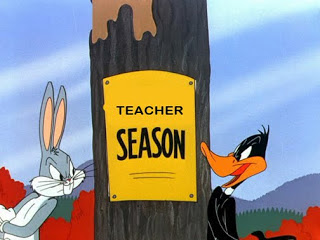"Gee I want to learn Spanish so I can take math tests in another language, " said no kid ever.
Yet that's precisely the policy of NYSED, whose official rationale for stand alone ESL classes is, and I'm not kidding. “Students receive English language development instruction in order to acquire the English language needed for core content areas."
As teachers, it’s our job to somehow persuade students to love our subjects. My job is to teach English to speakers of other languages. It’s pretty easy to make kids love English. I don’t even have to trick them. They can take what I teach them and use it not only that very day, but also for the rest of their lives.
If you’re the child of immigrants, your parents might depend on you for more than just taking out the garbage and doing homework. Since you’ll learn English faster than your parents, you might become a part-time translator. Dental appointment? ER visit? Let the kid help. Trip to the supermarket? Bring the kid in case you have questions. Over the last thirty years I’ve heard countless examples.
Not only that, but you might have personal needs. The very best language learners are social. That’s intrinsic motivation. When the teacher shows you how to introduce yourself, you hang on every word. After all, you want to make friends. When the crazy teacher sits you at a table with three people who don’t speak your first language, it may be the only time in your young life when you’re forced to use English.
One of my students wrote a very funny story about his struggle to order a hamburger in a restaurant. He described the gesticulation and pointing, the misunderstandings that occurred, and the eventual communication between he and the server. After taking my class, he was able not only to order hamburgers easily, but also to write about his struggles to learn how. (That may sound like a minor achievement, but if you’re with teenagers all day you know perpetual hunger is a an ongoing issue.)
I could certainly re-orient my classes to conform to NYSED’s concept. What would happen if I revolved my classes around geometry or earth science? Do you think my students would respond better with test-prep over communication and survival skills? I don’t.
Not only that, but everything I’ve read about language acquisition suggests NYSED is horribly wrong. Language is different from other subjects in that how well you grasp it may not be as linked to intelligence as it is to affect. For example, my student, I’ll call her Maria, loves being here. At first, she was angry when I placed her at a table with no one who spoke her language. Within weeks, however, she was chatting with the boy next to her. He and Maria shared sharp senses of humor. They unwittingly helped one another to learn English all year long. That’s what I call a win-win.
On the other hand, my student John didn’t love the US and was dragged here kicking and screaming. He never spoke to anyone. He didn’t care who he sat with, and his sole interest was figuring out how to use his phone in class without having me confiscate it. I can smell illicit phone use, John didn’t like that, and eventually he stopped coming altogether.
Do you think English lessons revolving around geometry would have won him over? I don’t. Had I done what NYSED wanted, I’d have lost not only John, but also Maria and her friend.
Newcomers need a place they feel understood. They need a place they feel safe. I can give them that, and I can ease them into using our language. I can show them the joy of communicating in a new language. Were I to do what NYSED wanted, all of my students would not only fail my class, but also lose their very best path to understanding the others.
NYSED’s notion that English is not in itself a subject is nothing short of idiotic. I’m a teacher, and idiotic is not remotely what I want to model for my students.
The Downsides of Immortality
3 hours ago



























